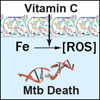 Vilchèze C, Hartman T, Weinrick B, and Jacobs W. Mycobacterium tuberculosis is extraordinarily sensitive to killing by a vitamin C-induced Fenton reaction. Nature Communications. 2013 May 21; 4(1881). doi:10.1038/ncomms2898
Vilchèze C, Hartman T, Weinrick B, and Jacobs W. Mycobacterium tuberculosis is extraordinarily sensitive to killing by a vitamin C-induced Fenton reaction. Nature Communications. 2013 May 21; 4(1881). doi:10.1038/ncomms2898
Abstract:
Drugs that kill tuberculosis more quickly could shorten chemotherapy significantly. In Escherichia coli, a common mechanism of cell death by bactericidal antibiotics involves the generation of highly reactive hydroxyl radicals via the Fenton reaction. Here we show that vitamin C, a compound known to drive the Fenton reaction, sterilizes cultures of drug-susceptible and drug-resistant Mycobacterium tuberculosis, the causative agent of tuberculosis. While M. tuberculosis is highly susceptible to killing by vitamin C, other Gram-positive and Gram-negative pathogens are not. The bactericidal activity of vitamin C against M. tuberculosis is dependent on high ferrous ion levels and reactive oxygen species production, and causes a pleiotropic effect affecting several biological processes. This study enlightens the possible benefits of adding vitamin C to an anti-tuberculosis regimen and suggests that the development of drugs that generate high oxidative burst could be of great use in tuberculosis treatment.
Additional Coverage:
Study Claims Vitamin C Kills ‘Hard-To-Kill’ Tuberculosis
Drug-Resistant Tuberculosis Killed by Vitamin C
Additional TB R&D Updates:
Consensus Statement on Research Definitions for Drug-Resistant Tuberculosis in Children
Advances in the development of new tuberculosis drugs and treatment regimens
Must-see morning clip: Bill Gates plans to eliminate polio and tuberculosis

